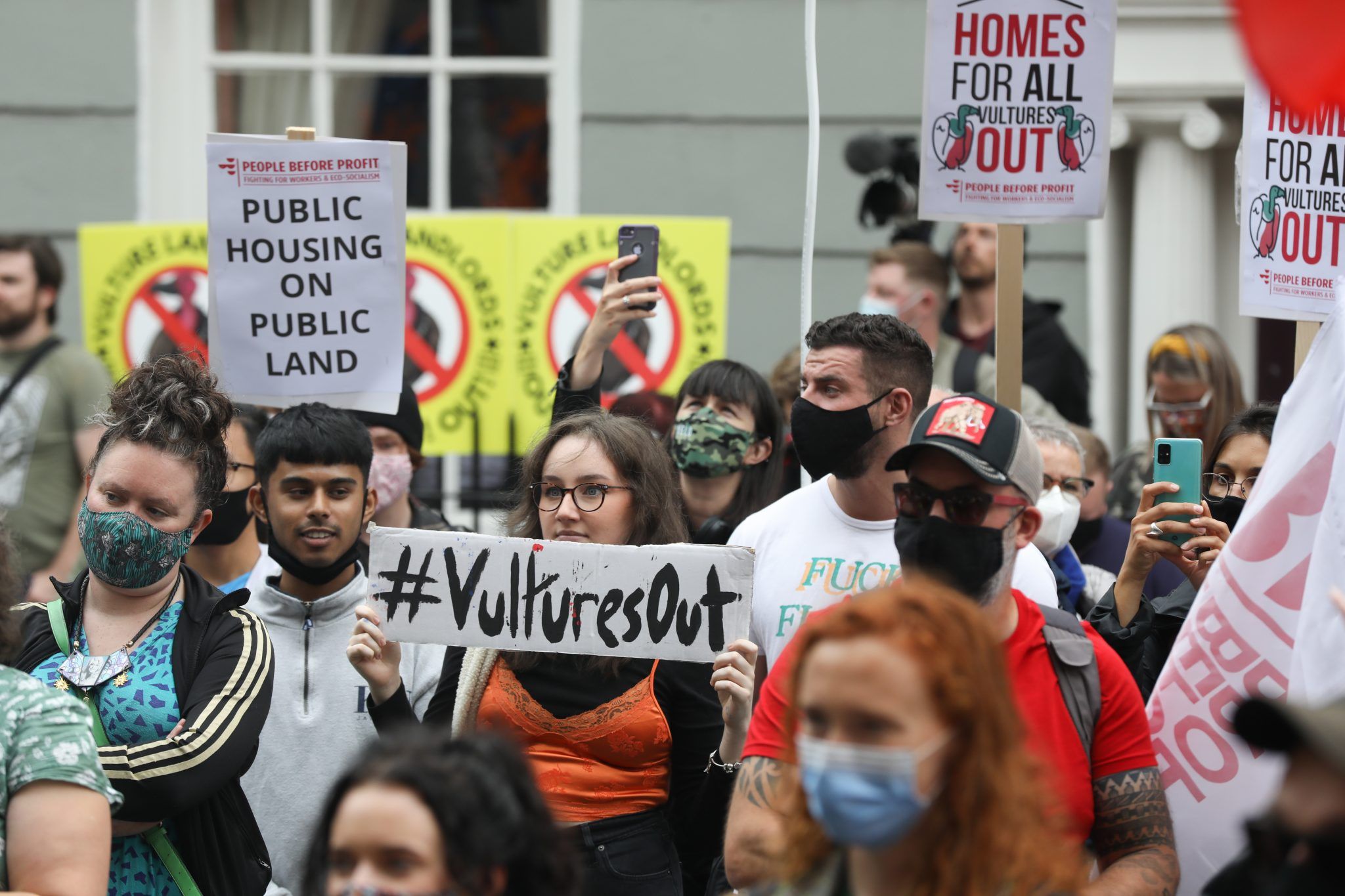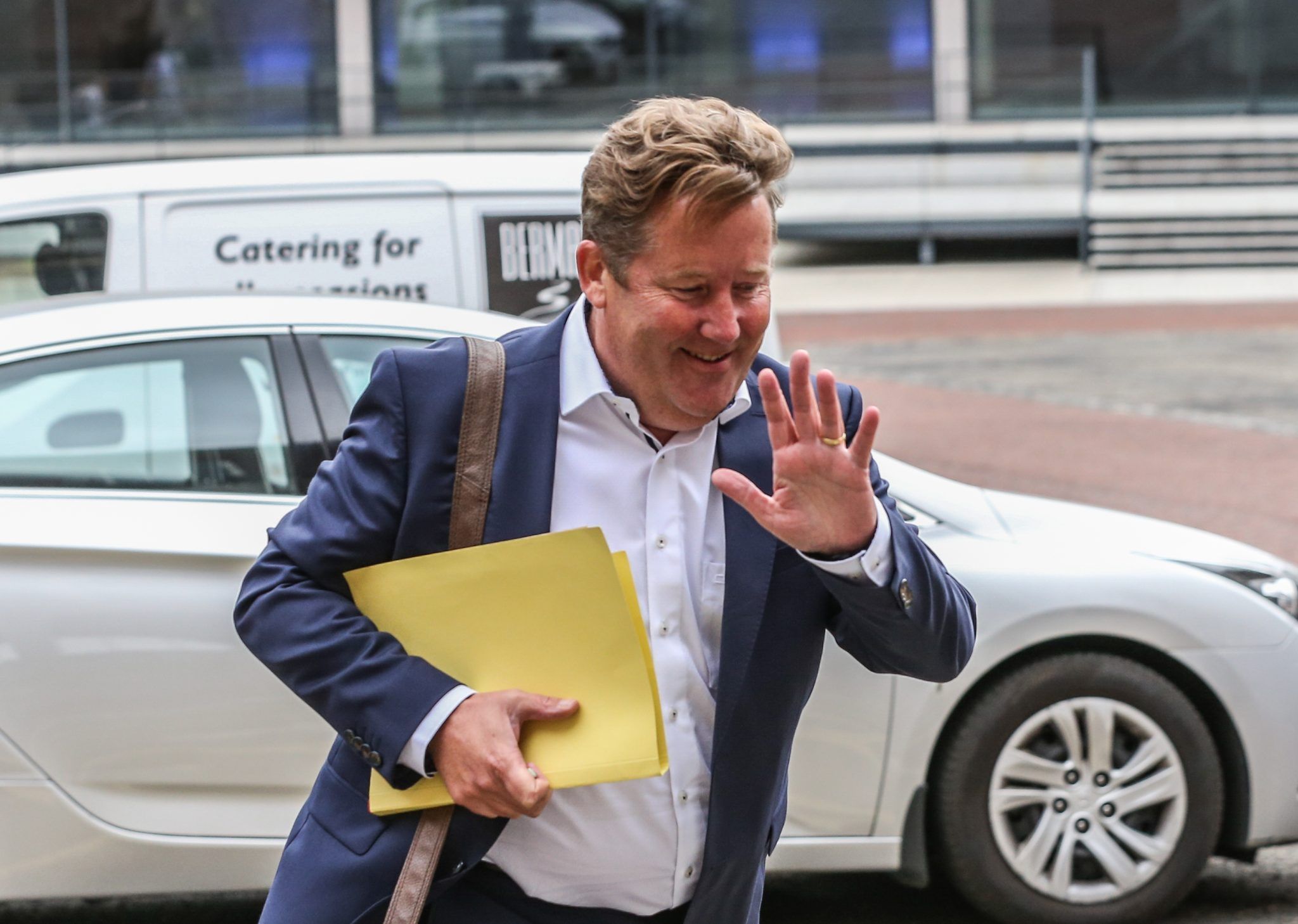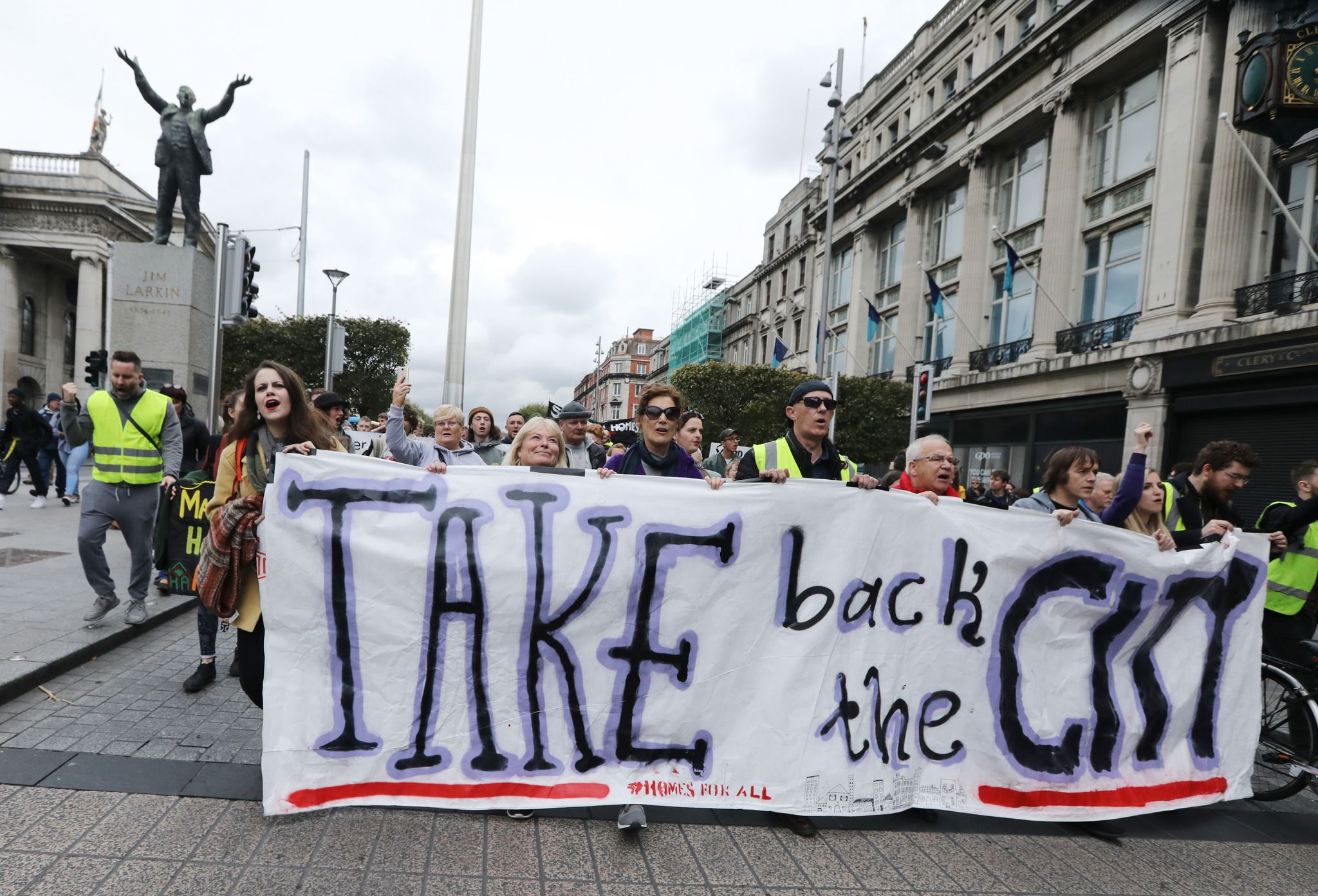

Share
2nd October 2021
07:45am BST


Last Sunday, citizens of Berlin voted in favour of a referendum that seeks to force property companies to sell housing units acquired by private investors in the '90s back to the people, simultaneously loosening a stranglehold on the individual and cementing protective measures for current and future generations. Not to mention inspiring others beyond the walls of Berlin. Though the referendum is non-binding and it remains to be seen how local and national government will respond – should they respond at all – the move has nonetheless been hailed worldwide as a radical step in a more harmonious direction. Naturally, with Ireland in the grip of its own perilous housing emergency, the actions and attitudes of those in Berlin haven't gone unnoticed among our own citizenship. "What we should be looking at with Berlin is that corporate landlords in a housing market make your housing more unaffordable," says Dr Rory Hearne, Assistant Professor of Social Policy at NUI Maynooth and author of Housing Shock: The Irish Housing Crisis and How to Solve It. "What Berlin is doing, what the people are trying to do, is to essentially buy back housing units off the corporate landlords in order to try and make them affordable. The referendum clearly showed that the people of Berlin want that. "The thing is that here in Ireland, we’ve kind of just started over the last four or five years on that road of corporate landlords playing a big role in our housing system," Hearne continues. "What we should be doing is learning from that and really stopping the increased role of corporate landlords so that we avoid getting to that place where they control so much of the housing system that they are determining rents. Already, we are seeing parts of that in places in Dublin. "The referendum, for me, is a real sign of hope that citizens are able to push back and say, ‘Look, we want affordable housing, we’re demanding affordable housing and we’re demanding real action’. The question is whether the city government in Berlin and national government in Germany will actually go about and implement what the people looked for in the referendum.""The referendum is a real sign of hope that citizens are able to push back."
 Protestors make themselves heard at the National Homeless & Housing Coalition rally outside Leinster House, September 2021. Image via Leah Farrell / RollingNews.ie
Protestors make themselves heard at the National Homeless & Housing Coalition rally outside Leinster House, September 2021. Image via Leah Farrell / RollingNews.ie
It all sounds healthy and life-affirming, but could such a model actually come to pass? Berlin is a famously cosmopolitan and expressive part of the world and yet the referendum result threatens to register as little more than a nice-looking story that trends on Twitter for a few hours, perhaps a few days at most. People having control of their housing options and enjoying a basic human right to a roof over their head shouldn't feel like an increasingly challenging concept. But it is. Wondering where you might be living in the next couple of months let alone the next couple of years shouldn't provoke gut-wrenching feelings of dread. But it does. Beyond the existential mire, a simple question – could the Berlin movement prompt a similar shift in Ireland? "Ultimately, the model in Germany is diametrically different to the Irish and English way of doing things," says Ronan Lupton, barrister with the Law Library of Ireland. "In fact, the Irish and English models are dramatically different in terms of how houses are sold." Drilling down into the Irish Constitution, Lupton points out a crucial barrier to a potential Berlin-esque approach here. "In terms of a local or regional discussion about taking up vacant properties – it simply wouldn’t work," he says. "As a matter of constitutional law, Article 43 is the article that protects private property. Constitutional scholars and lawyers would say, ‘Well, what is private property?’ and ask is a company entitled to hold vast swathes of private property – such as a vulture fund or venture capital fund owning blocks of apartments for the sole purpose of renting those apartments out for corporate lets at the premium rate or getting massive returns on their investment? "It comes back to the Irish model of, ‘We need to own everything, we need to make a return, our pension fund is our property’. The current situation with the constitution and the legal order is that the right to private property is protected under Article 43 subject only to the principles and policies of social justice and indeed the exigencies of the common good. "Now, you’re going to ask me – what does that all mean?" continues Lupton. "It means that there can be fair limitations placed on private property ownership but only insofar as those limitations are debated fully and have been brought through the Houses of the Oireachtas and are placed on statutory footing." What about public appetite for a referendum of our own? "There has been a debate about the constitutional right to housing and having a referendum about that," Lupton nods. "A referendum, as you and I and everybody knows, changes the structure of the constitution permanently, more or less, unless another referendum occurs to change it at a later stage... my view is that the balancing between the right to own private property under Article 43 of the constitution and a right to housing would conflict violently." What about those who have skin in the game at ownership level? Stephen Faughnan, chairman of the Irish Property Owners' Association, is also quick to acknowledge that Germany and Ireland have two very different systems in place, though he underscores that they are united by insufficient rental accommodation and affordability."In terms of a local or regional discussion about taking up vacant properties – it simply wouldn’t work."
"Expropriating 250,000 units of accommodation will have a huge financial cost to Berlin without providing any additional accommodation," argues Faughnan. "It will also deter investors from building accommodation or purchasing large blocks to let in the market if there is a risk that the property will be expropriated."
Admittedly, one finds it difficult to register sympathy in the direction of investors; perhaps the government could take care of them after prioritising, you know, the people who don't have a place to live. But we digress."It is likely to further exacerbate the problem."
"It is likely to result in less availability of accommodation in the long-term and further exacerbate the problem," notes Faughnan.
"The referendum is non-binding. There is no comparison with the Irish rental market where unbalanced rent control penalised the landlords who rewarded good tenants by keeping rents low has resulted in 22,000 units of accommodation being removed from the market since 2016."
The issue of cost is echoed by William Glucroft, political analyst for German broadcaster Deutsche Welle. Speaking on Virgin Media News on Sunday, Glucroft outlined the "hugely controversial" nature of the Berlin referendum. "Depending on what study you're looking at, it could cost the city something that they just simply cannot afford – in the hundreds of billons, maybe even more, to buy back all those apartments from these private companies," he said. And that's even if it moves forward. In line with the remarks above, Glucroft would go on to posit that should the referendum pass, it would lead to a debate that would "definitely" be challenged in court and "likely" ultimately thrown out as unconstitutional. As for exclusively Irish expense, the upcoming Budget is unavoidably set to be cast in the shadow of the last 19 months and a severe tightening of the country's collective belt is all but guaranteed. That said, and without wishing to sound insanely naive here, the government has found the means before in an emergency scenario. Is housing not one such crunch situation?For Rory Hearne, there's a tangible and unprecedented starkness to the crisis. "The key thing is that we now have a generation that is being locked out of getting affordable homes to rent or buy," he underlines. "That’s never happened in this country before to this extent. Young people are here – and it’s not just young people; it’s obviously older people and we’ve heard those stories of people in their 50s who are living in sheds, horrendous stories – and they are the generation, the millennials, the young people, who brought about marriage equality, who drove Repeal, who are driving huge social change. "So, if they can bring about that level of social change, why can’t they also drive social change on housing and force the government to change its policies? I think a key thing would be a referendum on the right to housing – to put it in the constitution. The government is committed to a referendum in its programme for government – they mention it in the Housing For All plan, as well. "My big fear is that young people in Ireland just emigrate and give up. Not just young people, as I said, it’s people in their 30s and 40s, but that’s my big fear and I think that would be a massive loss to this country. I think it’s very possible.""My big fear is that young people in Ireland emigrate and give up."
 Minister for Housing Darragh O'Brien on the move. Image via Sasko Lazarov / RollingNews.ie
Minister for Housing Darragh O'Brien on the move. Image via Sasko Lazarov / RollingNews.ie
The Irish government is clearly feeling the pressure, but how is it reacting? On Monday, Minister for Housing Darragh O'Brien played down the idea that the property market in Ireland is out of control, speculating that house prices will "level off" within the next year. On Tuesday, during Leaders' Questions in Dáil Éireann, Sinn Féin leader Mary Lou McDonald raised comments made by Tánaiste Varadkar in late September when he posited that "one person's rent is another person's income" as he rejected calls for a proposed three-year rent freeze. "What planet are these men living on?" asked McDonald in the Dáil. "Will you get a grip on this?" she added. In response, Taoiseach Micheál Martin declared housing as "the number one social crisis of our time" and accused Sinn Féin of not playing its part. It's a familiar story, one that seems no closer to arriving at a happy ending, and for all of the Taoiseach's spirited speeches on both the housing and climate emergencies currently facing different generations of Irish citizens, it is difficult not to regard these weekly circular debates as much more than by-numbers political point-scoring and a familiar collection of kick-the-can-down-the-road empty promises. Attempts by JOE to reach the Minister for Housing for comment on this article proved unsuccessful. “We don’t do speculation I’m afraid,” noted a spokesperson for the Department of Housing."What planet are these men living on?"
 Demonstrators gather at Dublin's O'Connell Street for a Take Back The City protest in September, 2018. Image via Eamonn Farrell / RollingNews.ie
Demonstrators gather at Dublin's O'Connell Street for a Take Back The City protest in September, 2018. Image via Eamonn Farrell / RollingNews.ie
We'll give the last word to Rory Hearne, who refuses to shy away from the despair that the housing crisis is causing but is also determined to find cracks of light amidst the chaos. "I think what we need… I would describe it as a cultural revolution on housing; that there’s such a mismatch between the generation that was able to buy a house and even buy a second house, and now this generation is locked out of even affordable rents, that we have to change how we see housing," says Hearne. "We have to turn it back into a home. For me, the hope is that people engage in that, we look to Berlin and people get inspired, they raise their voice. I think that’s the hope. "When we look at before Covid, you have to go back and you look at the last election and the young people and the renters who clearly came out and shifted their vote and voted for Sinn Féin, for example, around the housing policy – there’s no question that that happened. "The polls showed that for people aged 30 and under; housing was the key issue that determined how they voted. There was the Take Back The City protest that occupied vacant buildings. There were some very large housing protests. I think the momentum was building then and understandably Covid then stopped that. "I think the question is now – how do people gather themselves again in a post-Covid context, to build a social movement in housing like they did in Repeal and marriage equality?" Hearne adds. "It is about trying to find the key things that people will mobilise around be that the blanket ban on evictions again, the rent freeze, the referendum, and I think trying to use all the different ways that they used in those campaigns to get change on housing. It’s about people finding themselves again. We’re still within Covid, people are still struggling in many ways. "It will come again, though. I do believe it’s coming again and it’s going to be a tidal wave and I hope the tidal wave is going to win.""It’s going to be a tidal wave."
Explore more on these topics: